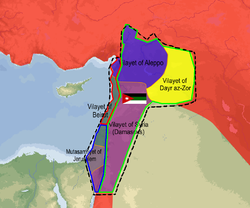Arab Kingdom of Syria
| Arab Kingdom of Syria | ||||||||||||||
|
المملكة العربية السورية al-Mamlakah al-‘Arabīyah as-Sūrīyah |
||||||||||||||
|
||||||||||||||
| Capital | Damascus | |||||||||||||
| Languages | Arabic | |||||||||||||
| Government | Constitutional monarchy | |||||||||||||
| King | Faisal I | |||||||||||||
| Prime Minister | ||||||||||||||
| • | 1920 | Rida Pasha al-Rikabi | ||||||||||||
| • | 1920 | Hashim al-Atassi | ||||||||||||
| Legislature | National Congress | |||||||||||||
| Historical era | Interwar period | |||||||||||||
| • | Coronation of Faisal I | 8 March 1920 | ||||||||||||
| • | Battle of Maysalun | 23 July 1920 | ||||||||||||
| • | Siege of Damascus | 24 July 1920 | ||||||||||||
| Currency | Syrian pound | |||||||||||||
|
||||||||||||||
| Today part of |
|
|||||||||||||
The Arab Kingdom of Syria (Arabic: المملكة العربية السورية, al-Mamlakah al-‘Arabīyah as-Sūrīyah) was the first modern Arab state to come into existence but only lasted a little over four months (8 March–24 July 1920). During its brief existence, the kingdom was led by Sharif Hussein bin Ali's son Faisal bin Hussein. Despite its claims to territory of a Greater Syria, Faisal's government controlled a limited area and was dependent on Britain which, along with France, generally opposed the idea of a Greater Syria and refused to recognize Faisal as its king. The kingdom surrendered to French forces on 24 July 1920.
The Arab Revolt and the McMahon–Hussein Correspondence are crucial factors in the foundations of the Arab Kingdom of Syria. In the McMahon–Hussein Correspondence the promises of an Arab Kingdom were made by the British in return for an Arab uprising against the Ottomans. As the promises of independence were being made by the British, separate agreements were being made including the Sykes–Picot Agreement with the French. Ultimately, the implementation of the Sykes–Picot Agreement would lead to the undermining and destruction of the Arab Kingdom of Syria. Despite the significance of the Arab Revolt to modern Arab countries formed in its wake, at the time there was significant distrust and even opposition to the idea of an Arab Kingdom or series of Arab Kingdoms.
...
Wikipedia


